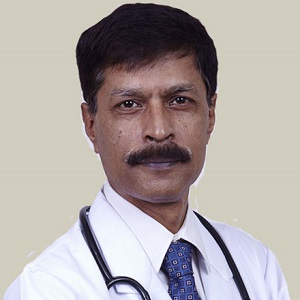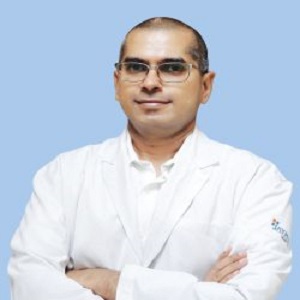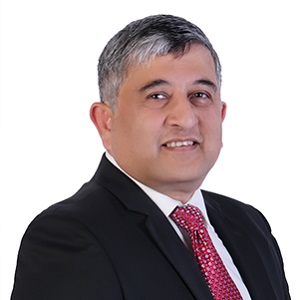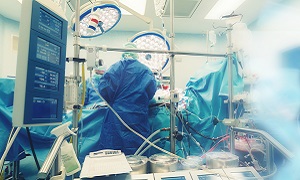Best Doctors in India for Pancreas Transplant
- Liver Transplant Surgeon and HPB Surgeon, New Delhi, India
- Over 20 years’ experience
- Venkateshwar Hospital, New Delhi
Profile Highlights:
- With over 20 years of experience in performing complex operations for cancer, and other diseases involving the pancreas, liver, and gall bladder, Dr. Anupam Saha has been the foremost gastro intestinal and Hepato-Pancreato-biliary surgeon of the Indian Armed Forces.
- He did a 1-year fellowship in Liver Transplantation as well, at King’s College Hospital, London.
- For his service, Dr. Anupam Saha has also been awarded the Vishist Sewa Medal by the Armed Forces.
- Liver Transplant Surgeon & HPB Surgeon, Noida, India
- Over 17 years’ experience
- Jaypee Hospital, Noida
Profile Highlights:
- Dr. K R Vasudevan is a surgical gastroenterologist who has been trained at one of India’s best hospitals. Over a short span of 17 years, his career has progressed to the role of leading a team.
- He has established and sustained a liver transplant program at PSRI over the last few years. Due to his experience with over 1200 live donor liver transplants, he was selected for this role.
- HBP & Liver Transplant Surgeon, Bengaluru, India
- Over 35 years’ experience
- Apollo Hospitals, Bengaluru, Gleneagles Global Hospital Bengaluru
Profile Highlights:
- Dr. Sanjay Govil is an accomplished HBP & Transplant Surgeon. He completed FRCS from the Royal College of Surgeons in England.
- He has achieved a few major accomplishments throughout his life as well, which include the First Liver Resection in Karnataka, in 2007, First Laparoscopic Liver Resection in a Cirrhotic Liver in Karnataka in the year 2008, First Laparoscopic Pancreatic duodenectomy in Karnataka in 2008, First ALPPS procedure in India in 2012 and several more.
- He trained in liver surgery and transplantation at Kings College Hospital in London, Queen Mary’s Hospital in Hong Kong, and the Graduate School of Medicine in Tokyo.
- Liver Transplant Surgeon and HPB Surgeon, Chennai, India
- Over 15 years’ experience
- Apollo Hospitals Greams Road
Profile Highlights:
- Dr. Selvakumar Naganathan is one of the best liver transplant surgeons in India with nearly 15 years of experience.
- He has carried out more than 2000 procedures, including 300 donor & 500 recipient hepatectomies, cadaver transplantations, retrieval of cadaver livers, and live donor liver transplants.
- He also established many liver transplantation centers across India & other countries.
- Liver Transplant Surgeon, Gurugram, India
- Over 10 years’ experience
- Medanta-The Medicity, Gurgaon
Profile Highlights:
- Dr. Prashant Vilas Bhangui is one of the highly trained liver transplant specialists who received his training in Surgical Gastroenterology and Liver Transplantation.
- He also holds a European Inter-University Diploma in Hepato-Biliary-Pancreatic Cancers.
- Dr. Prashant is further interested to work in certain fields which include hepatocellular carcinoma, colorectal liver metastases, and living donor liver transplantation. Besides this, he has also published several journals on these subjects.
- Liver Transplant Surgeon, Gurugram, India
- Over 17 years’ experience
- Artemis Hospital, Gurgaon
Profile Highlights:
- Dr. Shyam Sunder Mahansaria is an award-winning Organ Transplant Surgeon in Gurugram.
- He has managed several complex cases requiring a liver transplant or other open and laparoscopic GI surgeries during his career. He has performed nearly 500 liver uprooting surgical procedures
- Lung Transplant and Thoracic Surgery
- Over 36 years
- Medanta-The Medicity, Gurgaon
Profile Highlights:
- Dr. Arvind Kumar is a highly accomplished Thoracic Surgeon with over 36 years of experience in the field.
- He is recognized as one of India’s leading experts in the surgical treatment of chest-related diseases, particularly in Minimally Invasive and Robotic Surgery techniques.
- Currently serving as the Chairman of Lung Transplant and Thoracic Surgery at Medanta, Gurugram, he leads the hospital’s pioneering Chest Surgery Program.
Best Hospitals in India for Pancreas Transplant
- City: New Delhi, India
Hospital Highlights:
- Equipped with 650 beds, BLK-Max Super Speciality Hospital is the largest stand-alone private sector hospital in Delhi.
- With over 1500 healthcare providers and 150 globally renowned super specialists, the hospital is one of Asia’s largest BMT Centres. The hospital is known for having some of the best cancer doctors in the country.
- The hospital is NABH and NABL accredited and was inaugurated by the first Prime Minister of India. Pt. Jawahar Lal Nehru.
- City: Hyderabad, India
Hospital Highlights:
- Located in the vibrant city of Hyderabad, Apollo Health City is a world-renowned medical facility that provides outstanding care and treatment to patients coming from different parts of the world.
- Founded in 1988, this 550-bed multispecialty hospital with 50 specialties and 12 Centres of Excellence continues to deliver outstanding outcomes for patients with the simplest to the most complicated medical conditions.
- Backed by the latest medical equipment and a dedicated team of professionals, the hospital provides comprehensive treatment across various specialties including, cardiology, critical care, neurosciences, cancer, orthopedics, gynecology, ENT, transplants, gastroenterology, etc.
- Apollo Health City is a cutting-edge healthcare facility that combines various facilities under one roof. These may include state-of-the-art physical medicine, rehabilitation, and wellness services with education, research, telemedicine, innovative medical devices, disease management programmes, and medical talents.
- The hospital is known for offering top-notch cancer treatment accompanied by cutting-edge facilities and technology.
- The hospital also offers a broad spectrum of cosmetic procedures that improve not just appearance but also comfort.
- In 2011, Apollo Health City was the recipient of the Asian Hospital Management Award (AHMA).
- In 2013, the Government of India recognized Apollo Health City as the top medical tourism destination in the country.
- City: Mumbai, India
Hospital Highlights:
- Kokilaben Dhirubhai Ambani Hospital, Named after the wife of Indian industrialist Dhirubhai Ambani, the founder of Reliance Industries, this is one of the top hospitals in Mumbai. This 750-bed multi-specialty hospital became operational in 2009. Known as one of India’s most advanced tertiary care facilities, the hospital is designed to raise India’s global standing as a healthcare hub, with an emphasis on excellence in clinical services.
- Kokilaben Dhirubhai Ambani Hospital uses Protocol and Care Pathway based treatment models to ensure the best outcomes for patients.
- The hospital represents a confluence of top-notch talent, cutting-edge technology, state-of-the-art infrastructure, and, most importantly commitment.
- The hospital also holds the accreditation of the NABH, NABL, CAP, and JCI.
- The hospital has been recognized as the No. 1 Multispecialty Hospital in Mumbai and the West Zone for the fifth year in a row in 2020 by The Week.
- City: Chennai, India
Hospital Highlights:
- Apollo Cancer Centre in Teynampet, Chennai is one of the best super speciality hospitals in India. It is the country’s first ISO-certified healthcare facility.
- Additionally, it is the first hospital in Chennai and the first oncology hospital in India to receive NABH accreditation.
- The hospital provides advanced tertiary care in oncology, orthopedics, neurology and neurosurgery, head and neck surgery, and reconstructive and plastic surgery.
- Additionally, it offers specialized healthcare of international standards with results comparable to those of the best hospitals in the world.
- It is outfitted with 300 beds, the newest and greatest technology, a large pool of highly qualified specialists, and a committed team of medical and paramedical professionals.
- It is one of the first few medical facilities in India to offer comprehensive cancer care. A team of skilled medical, surgical, and radiation oncologists makes up the Tumour Board, which is a component of the complete treatment planning system. After reviewing reported cases, the Board determines in concert with diagnostic specialists what course of action is best for each individual patient. The panel is further supported by dieticians, medical counselors, speech therapists, and other pertinent specialists.
- The hospital launched the first ExcelsiusGPS® Spine Robot in South India and has completed over 50 surgeries till date.
- It is also one of the few cancer hospitals in India to offer Cyber Knife therapy. Till now it has completed 1320 Cyber Knife therapies.
- The institution is also one of the few in India with the capacity to do transplants and find a prospective unrelated donor. The hospital has performed over 1000 BMTs till now.
- Furthermore, it has an exceptional milestone of performing exultant Micro vascular free tissue transfer and Aesthetic surgeries on more than 1000 patients with success.
- City: Chennai, India
Hospital Highlights:
- Apollo Hospitals, Chennai, is one of the best hospitals for heart care in India. Over the years, Apollo has expanded all over India, as a healthcare chain.
- India’s first ‘Only Pancreas’ transplant was performed in Apollo Hospital. The hospital is known for successfully performing Asia’s first en-bloc combined heart and liver transplant, and over the years, it has attained a remarkable achievement in the global healthcare space. Around 3-4 organ transplants are performed in the hospital per day.
- Equipped with over 500 beds, this hospital in Chennai was established in 1983 and since then has been among the most preferred hospital for patients from all over the world.
- The hospital holds accreditation of the NABH and JCI and is the first hospital in India to be ISO 9001 and ISO 14001 certified. It is also the first South Indian Hospital to receive subsequent reaccreditation from the JCI USA 4 times.
- City: Chennai, India
Hospital Highlights:
- Established in 1999, Gleneagles Global Hospital, Chennai, is one of the top healthcare facilities in Southern India. It is part of the Gleneagles Hospital Chain, which is the fourth largest healthcare chain in the country. The hospital specializes in multi-organ transplants of kidneys, liver, lungs, heart, etc.
- The hospital has an excellent infrastructure and state-of-the-art lab and equipment set-up. The hospital boasts cutting-edge technologies, a highly skilled team of doctors and surgeons, and trained support staff. Located in Perumbakam, Chennai, it is one of India’s premier health care destinations. The hospital has performed some of the most complex surgical and clinical procedures in India including multi-organ transplantations.
- The hospital’s lung transplantation program is one of the best in the country. The hospital is known for having performed India’s first single lung transplant and first minimal invasive lung transplant. It is also the only Indian hospital to be associated with King’s College Hospital, London, United Kingdom for liver transplantations.
- City: Hyderabad, India
Hospital Highlights:
- KIMS Hospital (a brand name of Krishna Institute of Medical Sciences) is one of the largest and best multi-speciality hospitals in Hyderabad. The hospital provides various treatments to an enormous number of patients.
- The hospital has a capacity of more than 3000 beds. KIMS Hospitals offers different healthcare services in more than 25 specialities and super specialities.
- The hospital is equipped with modern medical equipment and technology. It has robotic equipment to provide minimal invasive techniques for patients.
- The hospital is aimed at providing world-class healthcare facilities and services at an affordable cost for patients.
- The various specialities and departments of the hospital include neurosciences, gastroenterology & hepatology, robotic science, reproductive sciences, dental science, oncological sciences, organ transplantation, heart and lung transplantation and mother and child care.
- City: Kolkata, India
Hospital Highlights:
- Established in 2003, Apollo Gleneagles Hospitals is a 750-bed multispecialty tertiary care hospital situated in Kolkata.
- With 33 Centres of Excellence and more than 50 specialties, Apollo Gleneagles Hospitals, Kolkata is capable of handling all sorts of patients.
- This tertiary care hospital, which is a 100% subsidiary of Apollo Hospitals Enterprise Ltd., India, is regarded as one of Kolkata’s top hospitals.
- The facility is a complete blend of cutting-edge technology, state-of-the-art infrastructure, and genuine hospitality.
- Focusing on numerous specialties, the hospital provides all-inclusive medical treatments supported by cutting-edge technology and a staff of highly qualified medical specialists.
- Patients across the globe come to Apollo Gleneagles Hospitals Kolkata for their treatment. Moreover, international patients receive full attention and assistance for their treatment and are provided with a hassle free experience.
- Apollo Gleneagles Hospitals, Kolkata is the only hospital in Eastern India to hold the Joint Commission International (JCI) certificate.
- It is also the only hospital in Kolkata to hold the NABL accreditation in six different categories, which includes Clinical Biochemistry, Clinical Pathology, Hematology & Immunohematology, Microbiology & Serology, and Histopathology & Cytopathology.
- Furthermore, Apollo Gleneagles Hospitals, Kolkata is known for performing the first ever Reverse Shoulder Prosthesis Replacement in East India.
- City: Bengaluru, India
Hospital Highlights:
- Established in 1991, Manipal Hospital, Old Airport Road, Bangalore is the flagship facility of the Manipal Hospitals Group, which is one of the largest networks of Multispecialty Private Hospitals in India.
- The facility is well-known for its state-of-the-art technology, performance-driven, patient-centric, and evidence-based approach.
- The facilities offered at Manipal Hospital meet the highest international standards, allowing the hospital to attract a large number of national and international patients.
- Their expertise encompasses the diagnosis and treatment of a wide range of diseases in several specializations that address both simple as well as complex medical procedures.
- There are total 600 beds accessible in the hospital for the in-patients so they may heal while being closely watched after by the medical team. In addition, it has 144 critical care units, including NICUs, ICCUs, and ICUs. Apart from that, the hospital also offers 20 contemporary, modular state-of-the-art operating rooms with all the amenities needed.
- The hospital has several departments that are overseen by highly skilled, certified, and experienced medical experts.
- One of the best departments in the hospital is that of the Cancer department which is known for its advanced cancer diagnosis and treatment facilities such as Intracavitary Chemotherapy, Biological Therapy, HIPEC, PIPEC, Nuclear Medicine, Radiation Therapy, etc.
- It is one of the few hospitals in Bangalore that provides full range of pediatric services, including pediatric emergency services, pediatric gastroenterology, pediatric neurology, pediatric cardiology, pediatric orthopaedics, pediatric allergies, pediatric immunology, and infectious diseases.
- Furthermore, Manipal Hospital, Old Airport Road, Bangalore is also regarded as one of the best hospitals for bone and spine related disorders.
- City: Mumbai, India
Hospital Highlights:
- Established in 2016, Apollo Hospitals, Navi Mumbai is one of Maharashtra’s most advanced multispecialty hospital. This 500-bed hospital provides sophisticated treatments and integrated super specialty services under one roof.
- The hospital features a cutting-edge infrastructure that houses 13 state-of-the-art operating rooms, advanced laboratory and medical diagnostics, and 120 ultra-modern I.C.U. beds, including N.I.C.U. and P.I.C.U., monitored round the clock by critical care specialists.
- With 57 specialties and subspecialties, the hospital boasts a team of renowned medical specialists who offer accurate diagnosis and treatment with easy accessibility to their patients.
- Additionally, the hospital offers highly customized, individualized health check programs that are made to fit each person’s needs in terms of lifestyle.
- Apollo Hospitals, Navi Mumbai has been accredited by both the National Accreditation Board for Hospitals and Healthcare Providers (NABH) and the Joint Commission International (JCI).
- Apollo Hospitals Navi Mumbai has been awarded the “Best Practices-International Services Award” at the annual awards for service excellence and operations excellence.
Pancreas Transplant
Pancreas transplant is a surgical procedure where a healthy pancreas is placed from a donor into a person whose pancreas no longer work properly. A pancreas transplant is often performed as a last resort and it has become a key treatment for people suffering from type 1 diabetes. This procedure is also sometimes carried out for people who need insulin therapy and suffer from type 2 diabetes, though this is less common.
The transplant is performed with the aim to restore normal blood glucose levels to your body. The transplanted pancreas can produce insulin for managing blood glucose levels.
This procedure is generally performed for people who are suffering from diabetes. It is generally not used to treat people with other conditions, though it is rarely used to treat certain types of cancer.
Process
A pancreas transplant can help in restoring normal insulin production and improving blood sugar control in people suffering from diabetes. However, it is not considered a standard treatment. In some cases, the side effects of anti-rejection medications can be serious.
Doctors can consider this procedure if their patients suffer from the following conditions:
- Type 1 diabetes that is not controllable with standard treatment
- Consistently poor blood sugar control
- Severe kidney damage
- Frequent insulin reactions
- Type 2 diabetes associated with low insulin resistance as well as low insulin production
Types
A pancreas transplant can be of multiple types:
Pancreas transplant alone- People suffering from diabetes and having early or no kidney disease are generally considered candidates for a pancreas transplant alone. A pancreas transplant surgery involves the placement of a healthy pancreas into a recipient whose pancreas is not functioning properly anymore.
Combined kidney-pancreas transplant- Surgeons are able to perform combined kidney-pancreas transplants for people having diabetes who are also having or are at risk of kidney failure. In such cases, the pancreas transplants are done at the same time as the kidney transplants.
This method can give you a healthy kidney and pancreas, which will most likely not contribute to diabetes-related kidney damage in the future.
Pancreas-after-kidney transplant– For people who are facing a long wait for a donor kidney and a donor pancreas to become available, a kidney transplant might be recommended at first if a living or deceased-donor kidney is available.
After the patient recovers from the kidney transplant surgery, they can later receive a pancreas transplant once a donor pancreas is available.
Pancreatic islet cell transplant- During this method, insulin-producing cells, i.e. islet cells that are taken from a deceased donor’s pancreas, will be injected into a vein that will be taking the blood to your liver. Generally, more than one injection of transplanted islet cells might be required.
Preparation
First, you will receive a medical evaluation at a transplant center before you undergo any kind of organ transplant. This will involve multiple tests, for determining your overall health, which includes a physical exam. Your medical history will be reviewed by a healthcare professional at the transplant center.
Before you undergo a pancreas transplant, there might be specific tests, which include:
- blood tests, such as an HIV test
- kidney function tests
- neuropsychological exams
- a chest X-ray
- studies for checking your heart function, such as an electrocardiogram or an echocardiogram
The evaluation process generally takes a month or two. It is done so that the doctor and healthcare team is able to determine whether you are a suitable candidate for the surgery and whether you will be able to handle the drug regiment which is required post-surgery.
Once it is determined, that you are a suitable candidate, then your name will be placed on the waiting list of the transplant center.
You will need to remember that different transplant centers are likely to have different kinds of preoperative protocols. These will vary further depending on the type of donor as well as the overall health of the recipient.
Procedure
The procedure is performed using general anesthesia and therefore you are unconscious throughout the procedure. The anesthetist can give you medication such as gas for breathing through a mask or may inject a liquid medication directly into one of your veins.
Once you are unconscious, your surgeon will first make an incision down the center of the abdomen. The surgeon will then place the new pancreas, as well as a small portion of the donor’s small intestine into your lower abdomen.
Next, the donor’s intestine is attached either to your small intestine or your bladder and the donor pancreas is then connected to blood vessels that supply blood to your legs. After this, your own pancreas is left in place for aiding digestion.
If you are undergoing a kidney transplant as well, then the blood vessels of the new kidney are attached to blood vessels in your abdomen’s lower part.
The new kidney’s ureter, which is the tube linking the kidney to the bladder, will next be connected to your bladder. Your kidneys are left in place unless they are causing any complications such as high blood pressure or infection.
Throughout the procedure, your blood pressure and blood oxygen will be monitored by the surgical team. The surgery can take around three to six hours. It will depend on whether you are having a pancreas transplant alone or a kidney transplant combined with a pancreas transplant.
After the procedure
Once the transplant surgery is complete, recipients are generally required to stay in the ICU for a few days so that he/she can be monitored for any complications. After this, he/she can move to a transplant recovery unit within the hospital.
Since a pancreas transplant involves various medications, a recipient’s drug therapy can require extensive monitoring, since they will need to take these drugs every day to prevent rejection of the new organ.
After a successful transplant, the new pancreas will be making the insulin required by your body and therefore you will not need insulin therapy to treat type 1 diabetes. However, even with the best possible match between the donor and you, your immune system will be trying to reject your new pancreas. This is why you will need anti-rejection medication so that your immune system can be suppressed. It is likely that these drugs can be required for the rest of your life. Medications that suppress the immune system generally makes your body more vulnerable to infection, and this is why your doctor might also prescribe antibacterial and antifungal medications.
Certain signs and symptoms can indicate your body rejecting your new pancreas:
- Belly pain
- Increased blood sugar levels
- Fever
- Excessive tenderness at the transplant site
- Decreased urination
- Vomiting
You will need to notify your transplant team immediately if you notice any of these symptoms.
Risks
Like any organ transplant, there is the possibility of a rejection of the new organ. It carries the risk of failure of the pancreas as well. Thanks to advancements in surgical and immunosuppressant medication therapy, the risk in this procedure have become low. In rare cases, there is also a risk of death.
The procedure itself carries several risks, such as bleeding, blood clots, as well as an infection. There is also a risk of hyperglycemia, which can occur during and right after the transplant.
The drugs which you will receive after the transplant can also lead to serious side effects. Some of these side effects include:
- high cholesterol
- thinning of the bones
- high blood pressure
- Hyperglycemia
- weight gain
- hair loss or excessive hair growth





















